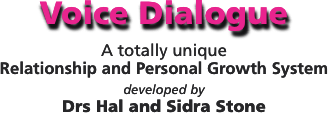Issue 121
Enhancing Relationships – Part 4
‘Dealing With Negativity In Relationship’
by
Hal and Sidra Stone
Most of us find that sharing our negative reactions with one another is even more difficult than generalized personal sharing of our process and feelings.
Our vulnerable child is afraid of abandonment, our critic tells us that we are making mountains out of molehills, our pleaser tells us that we have to be nice to people or they will not love us, our nurturing parent tells us that our partner is unable to bear the pain that our negativity will cause, and our protector/controller most probably will warn us that we are risking the relationship.
In addition to all this, we love our partner and, even in an aware ego, we do not want to inflict any pain. Unless we are in our judgmental parent and fully self righteous, most of us will not look forward to this part of a relationship.
But unfortunately, if we bury enough negative reactions, they have a tendency to build up and threaten the relationship. Those negative dragons have a way of growing extra heads very quickly when they are not dealt with appropriately.
There is a point in all relationships when the “falling in love” phase is over and we look at one another more soberly. Small annoyances begin to crop up. We suddenly realize that our partner does not close the kitchen cupboards after opening them or turn off the lights when leaving a room. Clothes are left lying around. Or, conversely, our partner is too neat and demands that we straighten up the house each day. One of us likes the window open, the other likes it closed. In the interest of peace, we withhold our reactions.
At some point, however, we must say something, or all our energy will be spent holding back reactions, and the spontaneity, vitality, and sexuality will disappear from the relationship.
Surprisingly enough, when negative reactions are shared through an aware ego, there is usually less discomfort than most of us might imagine. When we are sharing our reactions through an aware ego, there is no judgment and no blame. This makes it far more likely that our partner will be receptive to what we have to say.
Negative reactions, even negative reactions that are expressed through one of our power selves, are not to be judged. It is simply a question of becoming aware at some point of where they came from.
Learning to spend more time in the aware ego, and to express our negative reactions through the aware ego, becomes one of the working goals of relationship.
In a relationship that involves all of our selves, our partner is usually already aware of these negative reactions at some level. They have been transmitted in non-verbal form, energetically through body language, through our unconscious acts, our slips of the tongue or even through our jokes; therefore, they are rarely a total surprise.
Actually, the denial of these reactions has served to distance us from one another. In most instances talking things out helps to bring us back together with our partner, and, quite frequently, creative solutions can be reached that can deal effectively with many of our irritations.
Negative reactions, when brought through an aware ego, can also break bonding patterns. If both partners are in their aware egos, they are facing facts, and it is quite possible to learn from one another through these negative reactions. For example, there may be times when one or the other partner in a relationship becomes too identified with the perfectionist, too much at the mercy of a critic, too frequently the rescuing parent, or too dominated by the pusher. A clear reaction by the other may help to break the hold of that particular self and allow in something new.
Negative reactions, clearly presented, often signal the time for a change in consciousness. Relationships, when consciously lived, demand a great deal of all of us. When it is time to move on, to try something new, or to give up an old and no longer useful way of being in life, our partner’s negative reaction may well be the catalyst.
Upon close examination, we all find that our intensely judgmental negative reactions to our partners are a reflection of our own disowned selves. You have seen numerous examples of this in previous chapters.
In a relationship that encourages the exploration of these negative reactions, you are therefore quite likely to be brought face to face with your disowned selves. Working with your partner in this way can give you an unparalleled opportunity to find out about these selves and embrace them.
This is another way that you can truly get the most out of relationship. If you do not remain open to the possibility that a negative and judgmental reaction is a sign that a disowned self has been activated within you, then you not only lose an opportunity to continue your own personal growth, but you also may lock into a particularly unpleasant bonding pattern with your partner.
Your partner will then become more and more entrenched in the self that you disown, as you become more and more entrenched in its opposite. You may become more and more responsible as your partner becomes less and less so; you may become more disorganized and your partner more in control. This makes for great comedy, as anyone who has seen The Odd Couple knows, but it is not much fun in a primary relationship.

